
Томас Джефферсон
Memoir, Correspondence, And Miscellanies, From The Papers Of Thomas Jefferson, Volume 1
On the 22nd of July, Dr. Franklin, Mr. Adams, R. H. Lee, and myself were appointed a committee to consider and report on Lord North’s conciliatory resolution. The answer of the Virginia Assembly on that subject having been approved, I was requested by the committee to prepare this report, which will account for the similarity of feature in the two instruments.
On the 15th of May, 1776, the convention of Virginia instructed their delegates in Congress, to propose to that body to declare the colonies independent of Great Britain, and appointed a committee to prepare a declaration of rights and plan of government.
Here, in the original manuscript, commence the ‘two preceding sheets’ referred to by Mr. Jefferson, page 21, as containing ‘notes’ taken by him ‘whilst these things were going on.’ They are easily distinguished from the body of the MS. in which they were inserted by him, being of a paper very different in size, quality, and color, from that on which the latter is written:
In Congress, Friday, June 7, 1776. The delegates from Virginia moved, in obedience to instructions from their constituents, that the Congress should declare that these United Colonies and of right ought to be, free and independent states, that they are absolved from all allegiance to the British crown, and that all political connection between them and the state of Great Britain is and ought to be, totally dissolved; that measures should be immediately taken for procuring the assistance of foreign powers and a confederation be formed to bind the colonial more closely together.
The House being obliged to attend at that time to some other business, the proposition was referred to the next day, when the members were ordered to attend punctually at ten o’clock.
Saturday, June 8. They proceeded to take it into consideration, and referred it to a committee of the whole, into which they immediately resolved themselves, and passed that day and Monday the 10th in debating on the subject.
It was argued by Wilson, Robert R. Livingston, E. Rutledge, Dickinson, and others—
That, though they were friends to the measures themselves, and saw the impossibility that we should ever again be united with Great Britain, yet they were against adopting them at this time:
That the conduct we had formerly observed was wise and proper now, of deferring to take any capital step till the voice of the people drove us into it:
That they were our power, and without them our declarations could not be carried into effect:
That the people of the middle colonies (Maryland, Delaware, Pennsylvania, the Jerseys, and New York) were not yet ripe for bidding adieu to British connection, but that they were fast ripening, and, in a short time, would join in the general voice of America:
That the resolution, entered into by this House on the 15th of May, for suppressing the exercise of all powers derived from the crown, had shown, by the ferment into which it had thrown these middle colonies, that they had not yet accommodated their minds to a separation from the mother country:
That some of them had expressly forbidden their delegates to consent to such a declaration, and others had given no instructions, and consequently no powers to give such consent:
That if the delegates of any particular colony had no power to declare such colony independent, certain they were, the others could not declare it for them; the colonies being as yet perfectly independent of each other:
That the assembly of Pennsylvania was now sitting above stairs, their convention would sit within a few days, the convention of New York was now sitting, and those of the Jerseys and Delaware counties would meet on the Monday following, and it was probable these bodies would take up the question of Independence, and would declare to their delegates the voice of their state:
That if such a declaration should now be agreed to, these delegates must retire, and possibly their colonies might secede from the Union:
That such a secession would weaken us more than could be compensated by any foreign alliance:
That in the event of such a division, foreign powers would either refuse to join themselves to our fortunes, or, having us so much in their power as that desperate declaration would place us, they would insist on terms proportionably more hard and prejudicial:
That we had little reason to expect an alliance with those to whom alone, as yet, we had cast our eyes:
That France and Spain had reason to be jealous of that rising power, which would one day certainly strip them of all their American possessions:
That it was more likely they should form a connection with the British Court, who, if they should find themselves unable otherwise to extricate themselves from their difficulties, would agree to a partition of our territories, restoring Canada to France, and the Floridas to Spain, to accomplish for themselves a recovery of these colonies:
That it would not be long before we should receive certain information of the disposition of the French court, from the agent whom we had sent to Paris for that purpose:
That if this disposition should be favorable, by waiting the event of the present campaign, which we all hoped would be successful, we should have reason to expect an alliance on better terms:
That this would in fact work no delay of any effectual aid from such ally, as, from the advance of the season and distance of our situation, it was impossible we could receive any assistance during this campaign:
That it was prudent to fix among ourselves the terms on which we would form alliance, before we declared we would form one at all events:
And that if these were agreed on, and our Declaration of Independence ready by the time our Ambassador should be prepared to sail, it would be as well, as to go into that Declaration at this day.
On the other side, it was urged by J. Adams, Lee, Wythe and others, that no gentleman had argued against the policy or the right of separation from Britain, nor had supposed it possible we should ever renew our connection; that they had only opposed its being now declared:
That the question was not whether, by a Declaration of Independence, we should make ourselves what we are not; but whether we should declare a fact which already exists:
That, as to the people or parliament of England, we had always been independent of them, their restraints on our trade deriving efficacy from our acquiescence only, and not from any rights they possessed of imposing them, and that so far, our connection had been federal only, and was now dissolved by the commencement of hostilities:
That, as to the King, we had been bound to him by allegiance, but that this bond was now dissolved by his assent to the late act of parliament, by which he declares us out of his protection, and by his levying war on us, a fact which had long ago proved us out of his protection; it being a certain position in law, that allegiance and protection are reciprocal, the one ceasing when the other is withdrawn:
That James the II. never declared the people of England out of his protection, yet his actions proved it and the parliament declared it:
No delegates then can be denied, or ever want, a power of declaring an existent truth:
That the delegates from the Delaware counties having declared their constituents ready to join, there are only two colonies, Pennsylvania and Maryland, whose delegates are absolutely tied up, and that these had, by their instructions, only reserved a right of confirming or rejecting the measure:
That the instructions from Pennsylvania might be accounted for from the times in which they were drawn, near a twelvemonth ago, since which the face of affairs has totally changed:
That within that time, it had become apparent that Britain was determined to accept nothing less than a carte-blanche, and that the King’s answer to the Lord Mayor, Aldermen, and Common Council of London, which had come to hand four days ago, must have satisfied every one of this point:
That the people wait for us to lead the way:
That they are in favor of the measure, though the instructions given by some of their representatives are not:
That the voice of the representatives is not always consonant with the voice of the people, and that this is remarkably the case in these middle colonies:
That the effect of the resolution of the 15th of May has proved this, which, raising the murmurs of some in the colonies of Pennsylvania and Maryland, called forth the opposing voice of the freer part of the people, and proved them to be the majority even in these colonies:
That the backwardness of these two colonies might be ascribed, partly to the influence of proprietary power and connections, and partly, to their having not yet been attacked by the enemy:
That these causes were not likely to be soon removed, as there seemed no probability that the enemy would make either of these the seat of this summer’s war:
That it would be vain to wait either weeks or months for perfect unanimity, since it was impossible that all men should ever become of one sentiment on any question:
That the conduct of some colonies, from the beginning of this contest, had given reason to suspect it was their settled policy to keep in the rear of the confederacy, that their particular prospect might be better, even in the worst event:
That, therefore, it was necessary for those colonies who had thrown themselves forward and hazarded all from the beginning, to come forward now also, and put all again to their own hazard:
That the history of the Dutch revolution, of whom three states only confederated at first, proved that a secession of some colonies would not be so dangerous as some apprehended:
That a declaration of Independence alone could render it consistent with European delicacy, for European powers to treat with us, or even to receive an Ambassador from us:
That till this, they would not receive our vessels into their ports, nor acknowledge the adjudications of our courts of admiralty to be legitimate, in cases of capture of British vessels:
That though France and Spain may be jealous of our rising power, they must think it will be much more formidable with the addition of Great Britain; and will therefore see it their interest to prevent a coalition; but should they refuse, we shall be but where we are; whereas without trying, we shall never know whether they will aid us or not:
That the present campaign may be unsuccessful, and therefore we had better propose an alliance while our affairs wear a hopeful aspect:
That to wait the event of this campaign will certainly work delay, because, during this summer, France may assist us effectually, by cutting off those supplies of provisions from England and Ireland, on which the enemy’s armies here are to depend; or by setting in motion the great power they have collected in the West Indies, and calling our enemy to the defence of the possessions they have there:
That it would be idle to lose time in settling the terms of alliance, till we had first determined we would enter into alliance:
That it is necessary to lose no time in opening a trade for our people, who will want clothes, and will want money too, for the payment of taxes:
And that the only misfortune is, that we did not enter into alliance with France six months sooner, as, besides opening her ports for the vent of our last year’s produce, she might have marched an army into Germany, and prevented the petty princes there, from selling their unhappy subjects to subdue us.
It appearing in the course of these debates, that the colonies of New York, New Jersey, Pennsylvania, Delaware, Maryland, and South Carolina were not yet matured for falling from the parent stem, but that they were fast advancing to that state, it was thought most prudent to wait awhile for them, and to postpone the final decision to July 1st: but, that this might occasion as little delay as possible, a committee was appointed to prepare a Declaration of Independence. The committee were John Adams, Dr. Franklin, Roger Sherman, Robert R. Livingston, and myself. Committees were also appointed, at the same time, to prepare a plan of confederation for the colonies, and to state the terms proper to be proposed for foreign alliance. The committee for drawing the Declaration of Independence, desired me to do it. It was accordingly done, and being approved by them, I reported it to the House on Friday, the 28th of June, when it was read and ordered to lie on the table. On Monday, the 1st of July, the House resolved itself into a committee of the whole, and resumed the consideration of the original motion made by the delegates of Virginia, which, being again debated through the day, was carried in the affirmative by the votes of New Hampshire, Connecticut, Massachusetts, Rhode Island, New Jersey, Maryland, Virginia, North Carolina, and Georgia. South Carolina and Pennsylvania voted against it. Delaware had but two members present, and they were divided. The delegates from New York declared they were for it themselves, and were assured their constituents were for it; but that their instructions having been drawn near a twelvemonth before, when reconciliation was still the general object, they were enjoined by them to do nothing which should impede that object. They therefore thought themselves not justifiable in voting on either side, and asked leave to withdraw from the question; which was given them. The committee rose and reported their resolution to the House. Mr. Edward Rutledge, of South Carolina, then requested the determination might be put off to the next day, as he believed his colleagues, though they disapproved of the resolution, would then join in it for the sake of unanimity. The ultimate question, whether the House would agree to the resolution of the committee, was accordingly postponed to the next day, when it was again moved, and South Carolina concurred in voting for it. In the mean time, a third member had come post from the Delaware counties, and turned the vote of that colony in favor of the resolution. Members of a different sentiment attending that morning from Pennsylvania also, her vote was changed, so that the whole twelve colonies, who were authorized to vote at all, gave their voices for it; and, within a few days, [July 9.] the convention of New York approved of it, and thus supplied the void occasioned by the withdrawing of her delegates from the vote.
Congress proceeded the same day to consider the Declaration of Independence, which had been reported and laid on the table the Friday preceding, and on Monday referred to a committee of the whole. The pusillanimous idea that we had friends in England worth keeping terms with, still haunted the minds of many. For this reason, those passages which conveyed censures on the people of England were struck out, lest they should give them offence. The clause too, reprobating the enslaving the inhabitants of Africa, was struck out in complaisance to South Carolina and Georgia, who had never attempted to restrain the importation of slaves, and who, on the contrary, still wished to continue it. Our northern brethren also, I believe, felt a little tender under those censures; for though their people had very few slaves themselves, yet they had been pretty considerable carriers of them to others. The debates having taken up the greater parts of the 2nd, 3rd, and 4th days of July, were, on the evening of the last, closed; the Declaration was reported by the committee, agreed to by the House, and signed by every member present, except Mr. Dickinson. As the sentiments of men are known, not only by what they receive, but what they reject also, I will state the form of the Declaration as originally reported. The parts struck out by Congress shall be distinguished by a black line drawn under them;7 and those inserted by them shall be placed in the margin, or in a concurrent column.
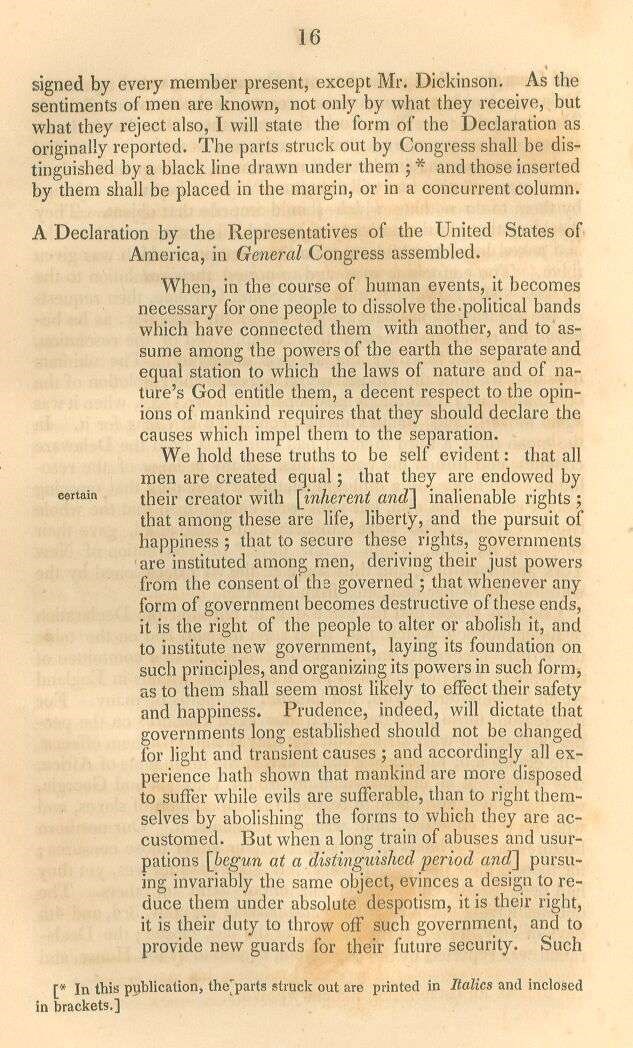
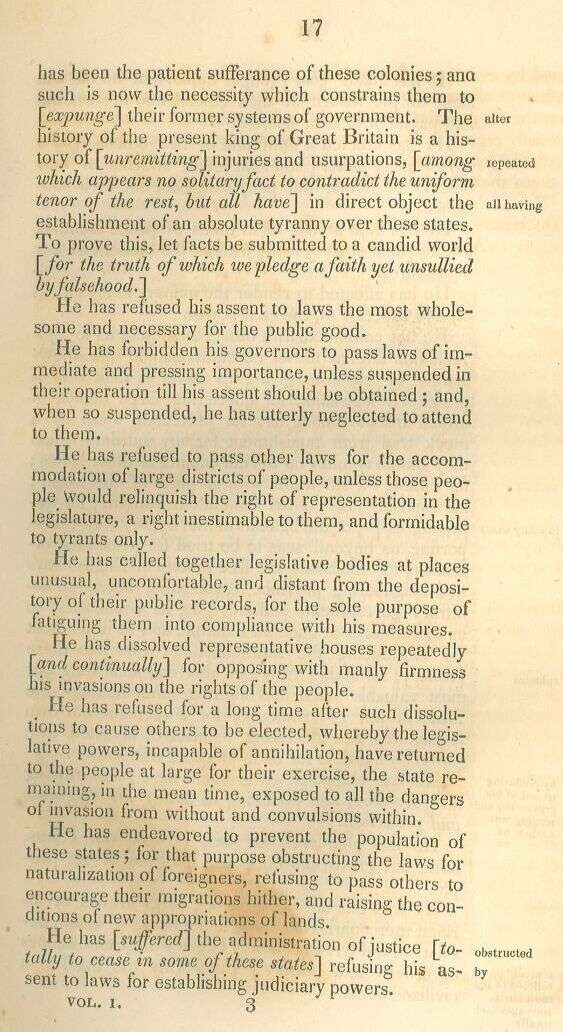
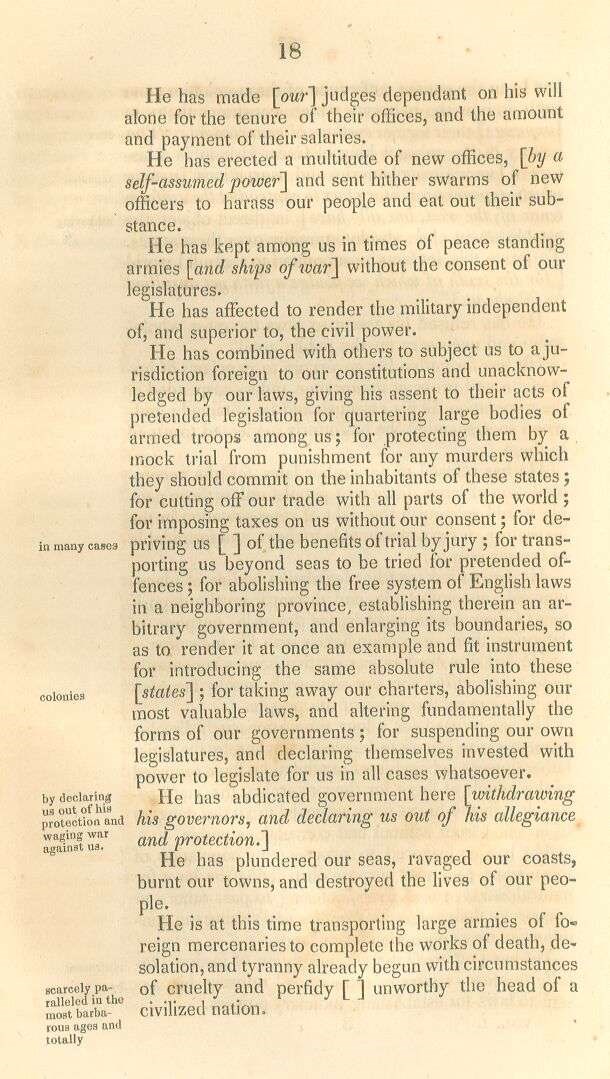
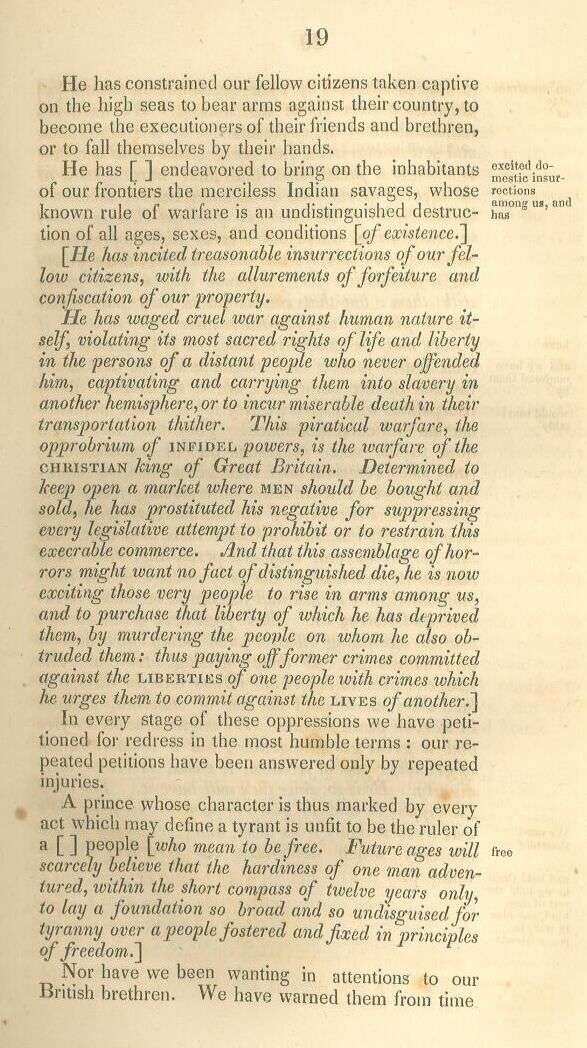
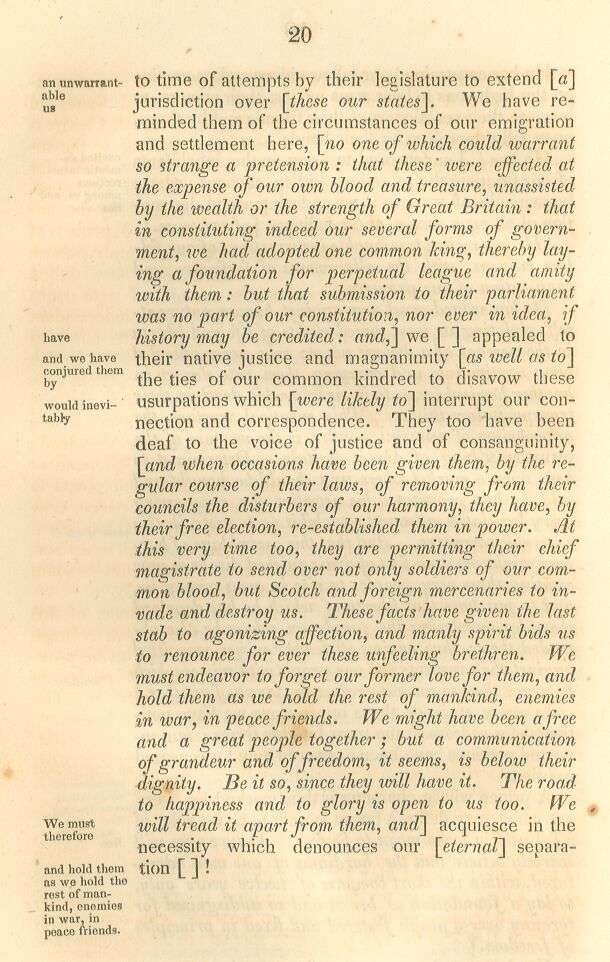
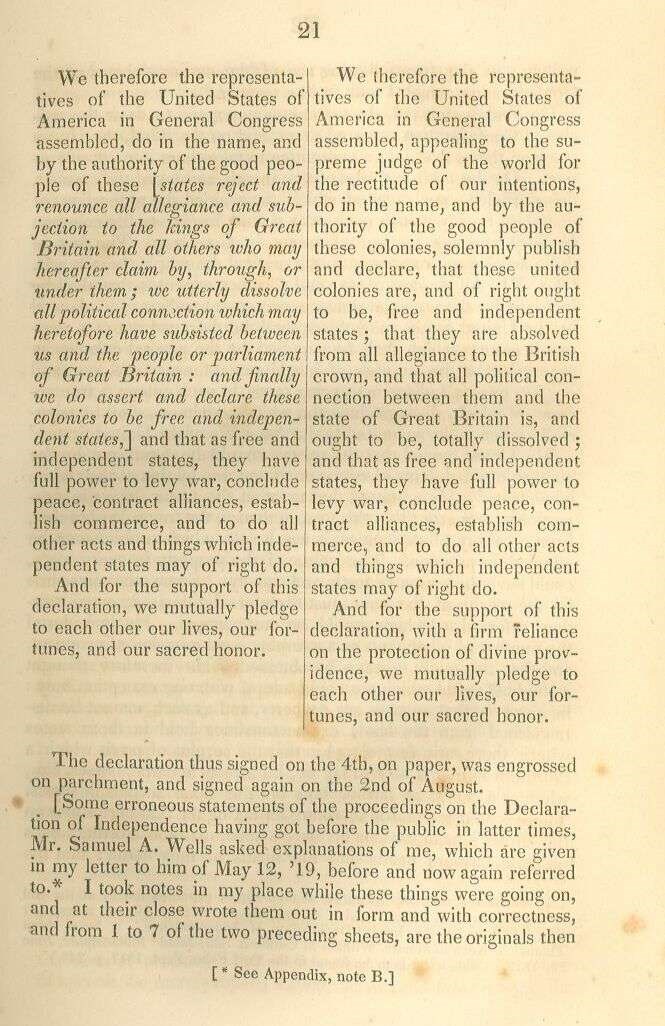
A DECLARATION BY THE REPRESENTATIVES OF THE UNITED STATES OF AMERICA, IN GENERAL CONGRESS ASSEMBLED.
When, in the course of human events, it becomes necessary for one people to dissolve the political bands which have connected them with another, and to assume among the powers of the earth the separate and equal station to which the laws of nature and of nature’s God entitle them, a decent respect to the opinions of mankind requires that they should declare the causes which impel them to the separation.
We hold these truths to be self evident: that all men are created equal; that they are endowed by their creator with [inherent and] (certain) inalienable rights; that among these are life, liberty, and the pursuit of happiness; that to secure these rights, governments are instituted among men, deriving their just powers from the consent of the governed; that whenever any form of government becomes destructive of these ends, it is the right of the people to alter or abolish it, and to institute new government, laying its foundation on such principles, and organizing its powers in such form, as to them shall seem most likely to effect their safety and happiness. Prudence, indeed, will dictate that governments long established should not be changed for light and transient causes; and accordingly all experience hath shown that mankind are more disposed to suffer while evils are sufferable, than to right themselves by abolishing the forms to which they are accustomed. But when a long train of abuses and usurpations [begun at a distinguished period and] pursuing invariably the same object, evinces a design to reduce them under absolute despotism, it is their right, it is their duty to throw off such government, and to provide new guards for their future security. Such has been the patient sufferance of these colonies; and such is now the necessity which constrains them to [expunge] (alter) their former systems of government. The history of the present king of Great Britain is a history of [unremitting] (repeated) injuries and usurpations, [among which appears no solitary act to contradict the uniform tenor of the rest, but all have] (all having) in direct object the establishment of an absolute tyranny over these states. To prove this, let facts be submitted to a candid world [for the truth of which we pledge a faith yet unsullied by falsehood.]
He has refused his assent to laws the most wholesome and necessary for the public good.
He has forbidden his governors to pass laws of immediate and pressing importance, unless suspended in their operation till his assent should be obtained; and, when so suspended, he has utterly neglected to attend to them.
He has refused to pass other laws for the accommodation of large districts of people, unless those people would relinquish the right of representation in the legislature, a right inestimable to them, and formidable to tyrants only.
He has called together legislative bodies at places unusual, uncomfortable, and distant from the depository of their public records, for the sole purpose of fatiguing them into compliance with his measures.
He has dissolved representative houses repeatedly [and continually] for opposing with manly firmness his invasions on the rights of the people.
He has refused for a long time after such dissolutions to cause others to be elected, whereby the legislative powers, incapable of annihilation, have returned to the people at large for their exercise, the state remaining, in the mean time, exposed to all the dangers of invasion from without and convulsions within.
He has endeavored to prevent the population of these states; for that purpose obstructing the laws for naturalization of foreigners, refusing to pass others to encourage their migrations hither, and raising the conditions of new appropriations of lands.
He has [suffered] (obstructed) the administration of justice [totally to cease in some of these states] (by) refusing his assent to laws for establishing judiciary powers.
He has made [our] judges dependant on his will alone for the tenure of their offices, and the amount and payment of their salaries.
He has erected a multitude of new offices, [by a self-assumed power] and sent hither swarms of new officers to harass our people and eat out their substance.
He has kept among us in times of peace standing armies [and ships of war] without the consent of our legislatures.
He has affected to render the military independent of, and superior to, the civil power.
He has combined with others to subject us to a jurisdiction foreign to our constitutions and unacknowledged by our laws, giving his assent to their acts of pretended legislation for quartering large bodies of armed troops among us; for protecting them by a mock trial from punishment for any murders which they should commit on the inhabitants of these states; for cutting off our trade with all parts of the world; for imposing taxes on us without our consent; for depriving us [ ] in many cases of the benefits of trial by jury; for transporting us beyond seas to be tried for pretended offences; for abolishing the free system of English laws in a neighboring province, establishing therein an arbitrary government, and enlarging its boundaries, so as to render it at once an example and fit instrument for introducing the same absolute rule into these [states] (colonies); for taking away our charters, abolishing our most valuable laws, and altering fundamentally the forms of our governments; for suspending our own legislatures, and declaring themselves invested with power to legislate for us in all cases whatsoever.
He has abdicated government here [withdrawing his governors, and declaring us out of his allegiance and protection.] (by declaring us out of his protection and waging war against us.)
He has plundered our seas, ravaged our coasts, burnt our towns, and destroyed the lives of our people.
He is at this time transporting large armies of foreign mercenaries to complete the works of death, desolation, and tyranny already begun with circumstances of cruelty and perfidy [ ] (scarcely paralleled in the most barbarous ages and totally) unworthy the head of a civilized nation.
He has constrained our fellow citizens taken captive on the high seas to bear arms against their country, to become the executioners of their friends and brethren, or to fall themselves by their hands.
He has [ ] (excited domestic insurrections amoungst us and has) endeavored to bring on the inhabitants of our frontiers the merciless Indian savages, whose known rule of warfare is an undistinguished destruction of all ages, sexes, and conditions [of existence.]
[He has incited treasonable insurrections of our fellow citizens, with the allurements of forfeiture and confiscation of our property.
He has waged cruel war against human nature itself, violating its most sacred rights of life and, liberty in the persons of a distant people who never offended him, captivating and carrying them into slavery in another hemisphere, or to incur miserable death in their transportation thither. This piratical warfare, the opprobrium of INFIDEL powers, is the warfare of the CHRISTIAN king of Great Britain. Determined to keep open a market where men should be bought and sold, he has prostituted his negative for suppressing every legislative attempt to prohibit or to restrain this execrable commerce. And that this assemblage of horrors might want no fact of distinguished die, he is now exciting those very people to rise in arms among us, and to purchase that liberty of which he has deprived them, by murdering the people on whom he also obtruded them: thus paying off former crimes committed against the liberties of one people with crimes which he urges them to commit against the lives of another.]
In every stage of these oppressions we have petitioned for redress in the most humble terms: our repeated petitions have been answered only by repeated injuries.
A prince whose character is thus marked by every act which may define a tyrant is unfit to be the ruler of a [ ] (free) people [who mean to be free. Future ages will scarcely believe that the hardiness of one man adventured, within the short compass of twelve years only, to lay a foundation so broad and so undisguised for tyranny over a people fostered and fixed in principles of freedom.]
Nor have we been wanting in attentions to our British brethren. We have warned them from time to time of attempts by their legislature to extend [a] (an unwarrantable) jurisdiction over [these our states] (us). We have reminded them of the circumstances of our emigration and settlement here, [no one of which could warrant so strange a pretension: that these were effected at the expense of our own blood and treasure, unassisted by the wealth or the strength of Great Britain: that in constituting indeed our several forms of government, we had adopted one common king, thereby laying a foundation for perpetual league and amity with them: but that submission to their parliament was no part of our constitution, nor ever in idea, if history may be credited: and,] we [ ] (have) appealed to their native justice and magnanimity [as well as to] (and we have conjured them by) the ties of our common kindred to disavow these usurpations which [were likely to] (would inevitably) interrupt our connection and correspondence. They too have been deaf to the voice of justice and of consanguinity, [and when occasions have been given them, by the regular course of their laws, of removing from their councils the disturbers of our harmony, they have, by their free election, re-established, them in power. At this very time too, they are permitting their chief magistrate to send over not only soldiers of our common blood, but Scotch and foreign mercenaries to invade and destroy us. These facts have given the last stab to agonizing affection, and manly spirit bids us to renounce for ever these unfeeling brethren. We must endeavor to forget our former love for them, and hold them as we hold the rest of mankind, enemies in war, in peace friends. We might have been a free and a great people together; but a communication of grandeur and of freedom, it seems, is below their dignity. Be it so, since they will have it. The road to happiness and to glory is open to us too. We will tread it apart from them, and] (We must therefore) acquiesce in the necessity which denounces our [eternal] separation [ ]! (and hold them as we hold the rest of mankind, enemies in war, in peace friends.)
[We therefore the representatives of the United States of America in General Congress assembled, do in the name, and by the authority of the good people of these states reject and renounce all allegiance and subjection to the kings of Great Britain and all others who may hereafter claim by, through, or under them; we utterly dissolve all political connection which may heretofore have subsisted between us and, the people or parliament of Great Britain: and finally we do assert and declare these colonies to be free and independent states, and that as free and independent states, they have full power to levy war, conclude peace, contract alliances, establish commerce, and to do all other acts and things which independent states may of right do.
And for the support of this declaration, we mutually pledge to each other our lives, our fortunes, and our sacred honor.]
(We therefore the representatives of the United States of America in General Congress assembled, appealing to the supreme judge of the world for the rectitude of our intentions, do in the name, and by the authority of the good people of these colonies, solemnly publish and declare, that these united colonies are, and of right ought to be, free and independent states; that they are absolved from all allegiance to the British crown, and that all political connection between them and the state of Great Britain is, and ought to be, totally dissolved; and that as free and independent states, they have full power to levy war, conclude peace, contract alliances, establish commerce, and to do all other acts and things which independent states may of right do.
And for the support of this declaration, with a firm reliance on the protection of divine providence, we mutually pledge to each other our lives, our fortunes, and our sacred honor.)
The declaration thus signed on the 4th, on paper, was engrossed on parchment, and signed again on the 2nd of August.
[8Some erroneous statements of the proceedings on the Declaration of Independence having got before the public in latter times, Mr. Samuel A. Wells asked explanations of me, which are given in my letter to him of May 12, ‘19, before and now again referred to. (See Appendix, note B.) I took notes in my place while these things were going on, and at their close wrote them out in form and with correctness, and from 1 to 7 of the two preceding sheets, are the originals then written; as the two following are of the earlier debates on the Confederation, which I took in like manner.]
[The following four images are from engravings taken from the Jefferson’s draft of the Declaration of Independence in his handwriting with some ammendations and changes in the handrwriting of Benjamin Franklin and John Adams–Click on any of these to enlarge the image to full-size.]
ENLARGE
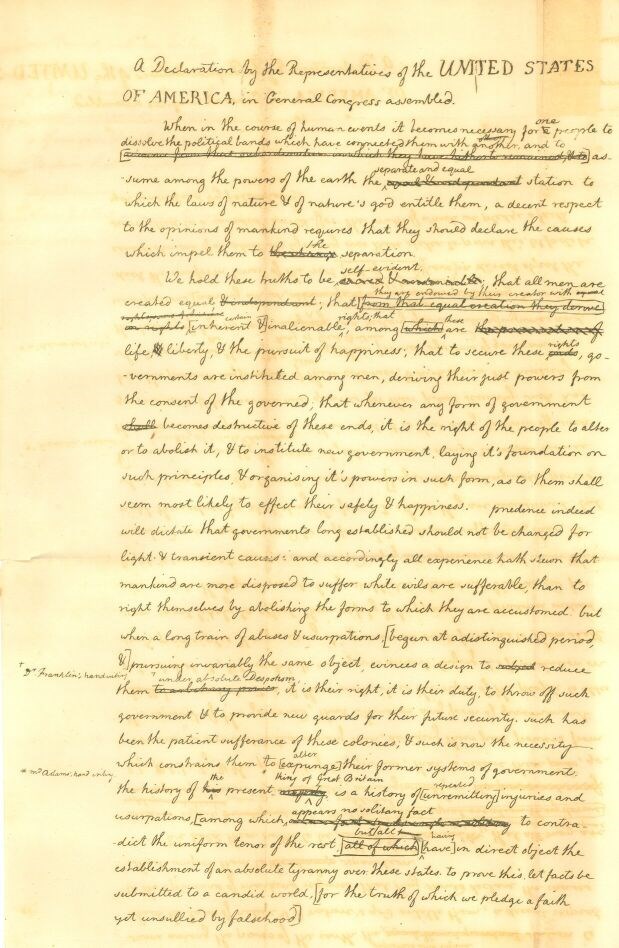
ENLARGE
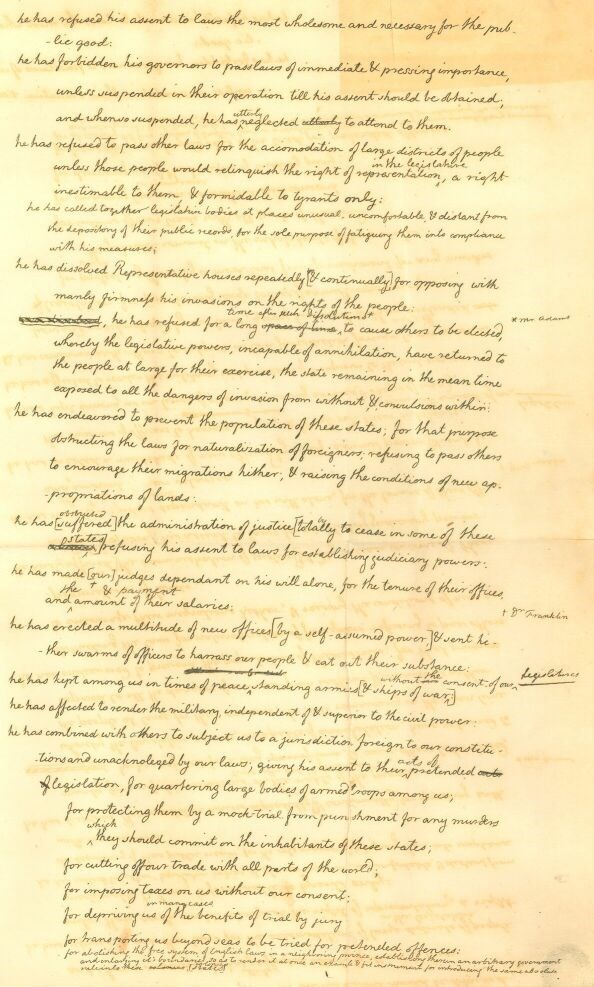
ENLARGE
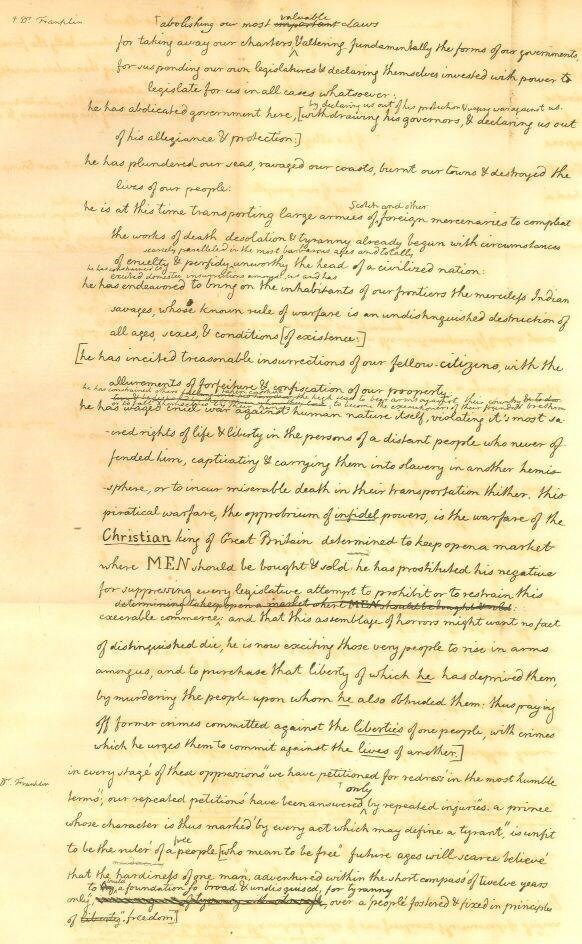
ENLARGE
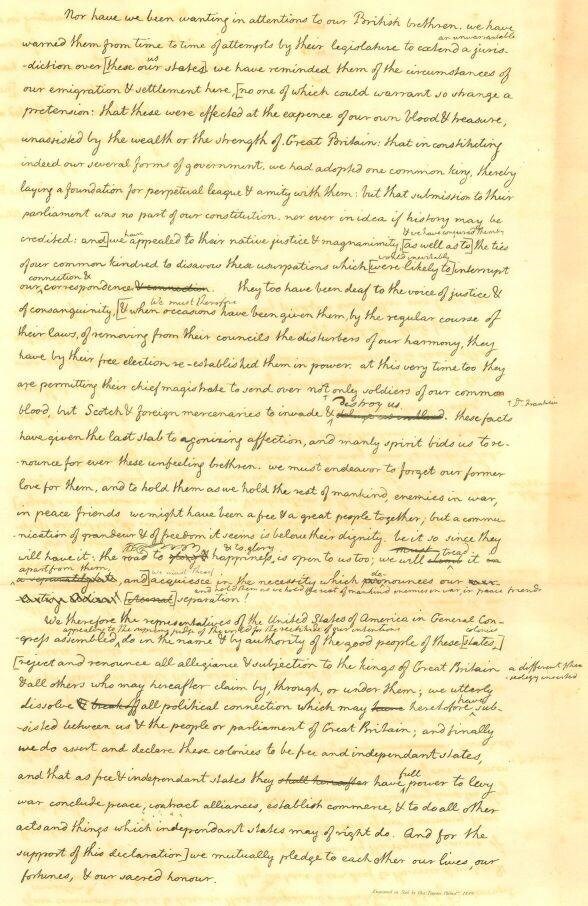
On Friday, July 12, the committee appointed to draw the articles of Confederation reported them, and on the 22nd, the House resolved themselves into a committee to take them into consideration. On the 30th and 31st of that month, and 1st of the ensuing, those articles were debated which determined the proportion, or quota, of money which each state should furnish to the common treasury, and the manner of voting in Congress. The first of these articles was expressed in the original draught in these words. ‘Art. XI. All charges of war and all other expenses that shall be incurred for the common defence, or general welfare, and allowed by the United States assembled, shall be defrayed out of a common treasury, which shall be supplied by the several colonies in proportion to the number of inhabitants of every age, sex, and quality, except Indians not paying taxes, in each colony, a true account-of which, distinguishing the white inhabitants, shall be triennially taken and transmitted to the Assembly of the United States.’






